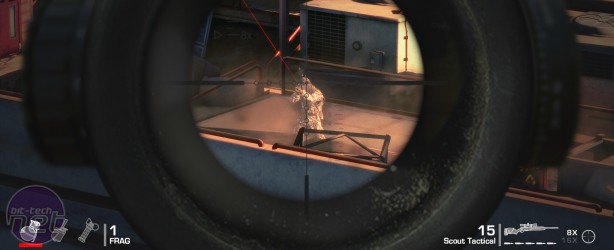Spec Ops: The Line Review
In Spec Ops' defence however, there are times when the choices work well or when you're given a genuine decision to make. It's merely the case that, looking back, the negative examples are the ones which stand out and which, ultimately, play a larger role in influencing the plot.It's only towards the end of the game that Spec Ops: The Line manages to regain lost ground on this front, building to a stunning climax where you're given a genuinely empowering and narratively worthwhile choice about the game's conclusion. All well and good, but by that point the damage has been done.
It bears restating however that, underneath all of the faulty choices and grazed-not-grabbed ambitions, Spec Ops: The Line is not a bad game. It's by no means the best third person shooter we've played, but it's also far from the worst - it sits squarely in the middle, as an average game.
Again though, that averageness is formed as a median, with Spec Ops' mechanics often bravely reaching further than they need to but failing to grab everything they hope for. Spec Ops deviates from the template set by the likes of Gears, for example, by letting you issue orders to your AI assistants - each of which are brilliantly written and excellently argue their ideals throughout the game.
Unfortunately, while issuing orders to allies is a meaningful addition, it's also pretty superfluous. There's not many occasions when you really need to call for support and when you do the fact that it's handled via a single context sensitive button means it can be too cumbersome to use. You may want to order your sniper, Lugo, to target a single enemy only to actually order your gunner, Riggs, to throw a flash grenade.
The ultimate result ends up similar to the result of the choice system; squad orders become more important in the final hour or two, but by then it's a case of too little, too late to really impress. All the successes ever manage to do is average out the failures which preceded them.
And yet, Spec Ops: The Line is not an average game. It is better than that, with part of that betterness coming from the fact that it is trying to more than the other games in its genre and partly coming from the limited successes it eventually achieves in the closing moments.
Factor that in on top of the generally average and predictable base and it becomes a lot easier to recommend Spec Ops: The Line to certain audiences, even in spite of its failings. Though the issues it has still remain very real and damning in regards to the game's ability to express the points it sets out to.
-
Airflow70 / 100


MSI MPG Velox 100R Chassis Review
October 14 2021 | 15:04












Want to comment? Please log in.